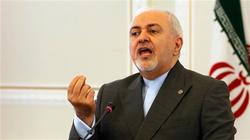 Iranian Foreign Minister Mohammad Javad Zarif says US President Donald Trump’s threat earlier this month to attack culturally-important centers in Iran amounts to an act of “international cultural terrorism.”
Iranian Foreign Minister Mohammad Javad Zarif says US President Donald Trump’s threat earlier this month to attack culturally-important centers in Iran amounts to an act of “international cultural terrorism.” RNA - The top diplomat said during a cultural gathering at the National Library in Tehran on Monday that Trump's threat was reminiscent of the destructive acts in contemporary history committed against international cultural properties and heritage sites by some warmongering or terrorist groups.
He cited the example of the Taliban militants’ destruction of Buddha statutes in Afghanistan in 2001 and the Daesh terror group’s razing of cultural heritage sites in Iraq and Syria in 2014 and 2015.
“And now, Donald Trump not only threatens Iran with an armed attack in egregious violation of the United Nations Charter, but he also openly talks about attacking Iran’s historical and cultural centers,” Zarif said.
Trump tweeted the threat on January 4 a day after the US assassinated General Qassem Soleimani, who was the Middle East’s most revered anti-terror military figure.
The attack came while General Soleimani, the commander of the Quds Force of Iran’s Islamic Revolution Guards Corps (IRGC), was on an official visit to the Iraqi capital.
The IRGC retaliated by targeting US military bases in the western Iraqi Anbar province and Erbil, the capital of the Iraqi Kurdistan Region.
Trump then said that if the Islamic Republic sought to retaliate for the assassination, the US could strike 52 important targets in Iran, including some of cultural importance.
Zarif denounced the assassination as an act of “state terrorism” against “one of the most popular personalities in Iran and the region.”
“The US brazenly takes pride in assassinating upstanding martyr Lieutenant General Soleimani, a great man, to whose struggle against terrorist and radical outfits the region and the world is indebted,” he added.
The foreign minister said the threat posed against Iran's cultural sites served as another instance of the illegal US actions aimed at breaking down the Iranian people’s resistance.
He reminded that Washington was already staging economic terrorism against the Iranian people by openly targeting their food and medical supplies through illegal sanctions.
Zarif cited remarks by US Secretary of State Mike Pompeo on BBC in November 2018 that Iranian authorities had to listen to Washington “if they want their people to eat.”
He said the US official’s remarks exemplified abetment to genocide and crime against humanity.
He named the US’s withdrawal under Trump from the UN cultural organization UNESCO, the Paris climate accord, a nuclear missile test ban treaty with Russia, and its departure from a historic 2015 nuclear agreement with Iran as examples of Washington’s unilateralism and the Trump regime’s battle against the law.
Trump’s calling the civilized and cultured Iranian people “terrorists” early in his presidency, Zarif noted, reflects his regime’s non-commitment to international legal red lines, including the principles prohibiting racism, discrimination, and contravention of universal and specific-purpose agreements.
He also warned countries, which tend to fall into line with the unilateral and illegal US actions in order to protect themselves against potential US aggression, that their submission to Washington actually paves the way for such aggression.
The US threat against Europe’s North Stream gas pipeline project with Russia, and its warning to increase tariffs on European exports to the United States is the “natural result and payback” for Europe’s inaction in the face of the US withdrawal from the nuclear deal, the top diplomat stated.
Washington and its European allies’ illegal actions, he said, are based “on the illusion that only the blue-eyed people, and not Iran, can draw benefits from international law.”
847/940